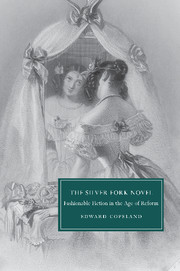102 results
Chapter 25 - Money and Economics
- from Part VI - Social Structures and Social Life
-
-
- Book:
- Samuel Richardson in Context
- Published online:
- 21 September 2017
- Print publication:
- 21 September 2017, pp 221-222
-
- Chapter
- Export citation
5 - Contemporary responses
-
-
- Book:
- The Cambridge Companion to ‘Emma'
- Published online:
- 05 September 2015
- Print publication:
- 25 August 2015, pp 68-87
-
- Chapter
- Export citation
Chapter 1 - Cultural contexts
-
- Book:
- The Silver Fork Novel
- Published online:
- 05 July 2012
- Print publication:
- 21 June 2012, pp 8-36
-
- Chapter
- Export citation
The Silver Fork Novel - Half title page
-
- Book:
- The Silver Fork Novel
- Published online:
- 05 July 2012
- Print publication:
- 21 June 2012, pp i-ii
-
- Chapter
- Export citation
Bibliography
-
- Book:
- The Silver Fork Novel
- Published online:
- 05 July 2012
- Print publication:
- 21 June 2012, pp 258-286
-
- Chapter
- Export citation
Chapter 6 - Reform and the silver fork heroine
-
- Book:
- The Silver Fork Novel
- Published online:
- 05 July 2012
- Print publication:
- 21 June 2012, pp 146-169
-
- Chapter
- Export citation
Introduction
-
- Book:
- The Silver Fork Novel
- Published online:
- 05 July 2012
- Print publication:
- 21 June 2012, pp 1-7
-
- Chapter
- Export citation

The Silver Fork Novel
- Fashionable Fiction in the Age of Reform
-
- Published online:
- 05 July 2012
- Print publication:
- 21 June 2012
Contents
-
- Book:
- The Silver Fork Novel
- Published online:
- 05 July 2012
- Print publication:
- 21 June 2012, pp vii-vii
-
- Chapter
- Export citation
Epilogue
-
- Book:
- The Silver Fork Novel
- Published online:
- 05 July 2012
- Print publication:
- 21 June 2012, pp 170-174
-
- Chapter
- Export citation
Appendix
-
- Book:
- The Silver Fork Novel
- Published online:
- 05 July 2012
- Print publication:
- 21 June 2012, pp 175-227
-
- Chapter
- Export citation
The Silver Fork Novel - Title page
-
-
- Book:
- The Silver Fork Novel
- Published online:
- 05 July 2012
- Print publication:
- 21 June 2012, pp v-v
-
- Chapter
- Export citation
Notes
-
- Book:
- The Silver Fork Novel
- Published online:
- 05 July 2012
- Print publication:
- 21 June 2012, pp 228-257
-
- Chapter
- Export citation
Index
-
- Book:
- The Silver Fork Novel
- Published online:
- 05 July 2012
- Print publication:
- 21 June 2012, pp 287-290
-
- Chapter
- Export citation
Copyright page
-
- Book:
- The Silver Fork Novel
- Published online:
- 05 July 2012
- Print publication:
- 21 June 2012, pp vi-vi
-
- Chapter
- Export citation
Chapter 5 - The topography of silver fork London
-
- Book:
- The Silver Fork Novel
- Published online:
- 05 July 2012
- Print publication:
- 21 June 2012, pp 128-145
-
- Chapter
- Export citation
Frontispiece
-
- Book:
- The Silver Fork Novel
- Published online:
- 05 July 2012
- Print publication:
- 21 June 2012, pp iv-iv
-
- Chapter
- Export citation
Chapter 3 - Reform and the silver fork novel
-
- Book:
- The Silver Fork Novel
- Published online:
- 05 July 2012
- Print publication:
- 21 June 2012, pp 65-99
-
- Chapter
- Export citation
Figures
-
- Book:
- The Silver Fork Novel
- Published online:
- 05 July 2012
- Print publication:
- 21 June 2012, pp viii-viii
-
- Chapter
- Export citation
Acknowledgements
-
- Book:
- The Silver Fork Novel
- Published online:
- 05 July 2012
- Print publication:
- 21 June 2012, pp ix-x
-
- Chapter
- Export citation



